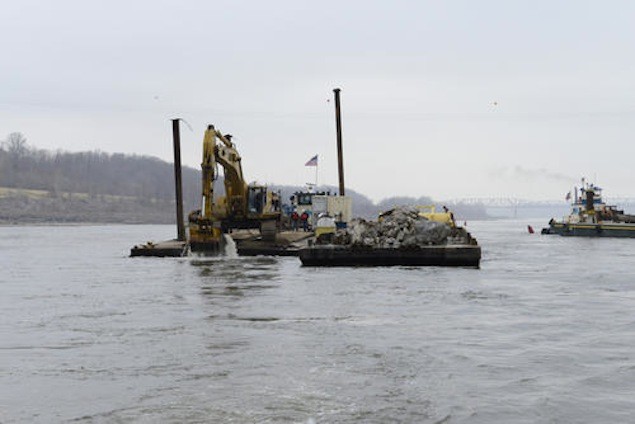Over 700 Barges Stranded by Mississippi River Closure in Memphis Due to Bridge Crack
The U.S. Coast Guard said 44 vessels with a total of 709 barges are now in the queue as a 1-miles stretch of the Mississippi River remains closed after a...

THEBES, Il. – Workers contracted by the Army Corps of Engineers clear rocks from the river floor near Thebes, Il., Dec. 17, 2012. U.S. Coast Guard photo by Petty Officer 3rd Class Ryan Tippets.
The drought-hit Mississippi River will stay open to commerce a few days longer than expected following the release of water from a lake in southern Illinois, a group of shippers said on Friday.
By Tom Polansek
The U.S. Army Corps of Engineers on Thursday ramped up its fight against rapidly falling water levels on the Mississippi River, a day after shippers warned the nation’s busiest waterway may effectively shut to commerce next week.
The Corps released water from a southern Illinois lake into the river to aid transportation. It would not affirm shippers’ forecasts for a potential closure but said water levels had decreased faster than expected due to ice forming in the river.
Workers also resumed clearing river-bottom rocks after a four-day holiday break to keep goods flowing on a key stretch near Thebes, Ill.
A group of shippers on Wednesday warned that river commerce at Thebes could “come to an effective halt” earlier than expected on January 3 or 4 due to declining water levels, disrupting the flow of billions of dollars worth of grain and other goods from the central United States to the U.S. Gulf Coast. The shippers had previously projected such a closure in mid January.
Shippers, who move about $7 billion in commodities on the Mississippi in December and January alone, for months have been monitoring river water levels between St. Louis, Missouri, and Cairo, Illinois, which includes Thebes, amid concerns about a potential closure.
Water on the Mississippi River is near record low due to the worst U.S. drought since 1956. The Army Corps has been dredging the river daily to keep it open and began clearing hazardous rocks from the shallow area near Thebes last week.
Such efforts, along with some timely precipitation, have helped delay an effective halt to shipments, which barge and towboat operators originally said could occur by Dec. 10.
Army Corps spokesman Mike Peterson on Thursday said he could not affirm the latest river-closure forecast by the shippers.
“I’m not going to dare to put my finger on the calendar somewhere because we’ve heard that a few times already,” he said in an interview. “We’re doing everything we can.”
The Mississippi River is the main shipping waterway for grain moving from Midwest farms to export facilities at the Gulf of Mexico. Some 55 to 65 percent of the U.S. corn, soybean and wheat exports exit the country via the Gulf.
Exporters stepped up shipments of grain and soybeans to the Gulf Coast before water levels fell to critically low levels. At the current lower water levels barges are having to take on lighter loads so as not to run aground. Exporters also resorted to loading more of goods on rail cars.
Barge and tugboat operators have said that thousands of jobs could be lost if the river closes.
“ICE BITE”
Ice upriver from Thebes has accelerated the decline in Mississippi River levels because it has slowed the water flow toward the Gulf, Petersen said.
The effect is known as “ice bite,” he said, because “the ice is taking a bite out of the river flow.”
The Mississippi River depth gauge at Thebes was 6 feet on Thursday and set to drop to around 3 feet by Jan. 3, according to the National Weather Service.
The decline could limit drafts, or the distance from the surface of the water to a boat’s lowest point, to less than the nine feet that most barge vessels need to operate, according to the Waterways Council, a river industry group.
The Army Corps released additional water from Carlyle Lake in southern Illinois to help keep the river above three feet at Thebes in the near term, Petersen said. It previously released water from the lake on Dec. 15.
The rock removal that resumed on Thursday will close the river near Thebes for 16 hours a day to barges heading south to the U.S. Gulf and northwards after emptying their cargoes at export terminals. River traffic is allowed to transit the six-mile work zone each night, but a backlog of barges forms during the day.
A queue of seven northbound barge tows and four southbound tows were waiting on Thursday afternoon to pass through the area, said U.S. Coast Guard spokesman Colin Fogarty, adding they should all be able to pass through the zone overnight.
The Coast Guard is “cognizant that there will be very real physical conditions facing us in the coming days,” he said.
“We only see things as realists. At some point, as these river levels drop, there are going to be a lot of vessels that cannot operate. There are some vessels that can continue to operate.” (Reporting By Tom Polansek; Editing by Bob Burgdorfer)
© 2012 Thomson Reuters.
This article contains reporting from Reuters, published under license.

Sign up for gCaptain’s newsletter and never miss an update

Subscribe to gCaptain Daily and stay informed with the latest global maritime and offshore news
Essential news coupled with the finest maritime content sourced from across the globe.
Sign Up